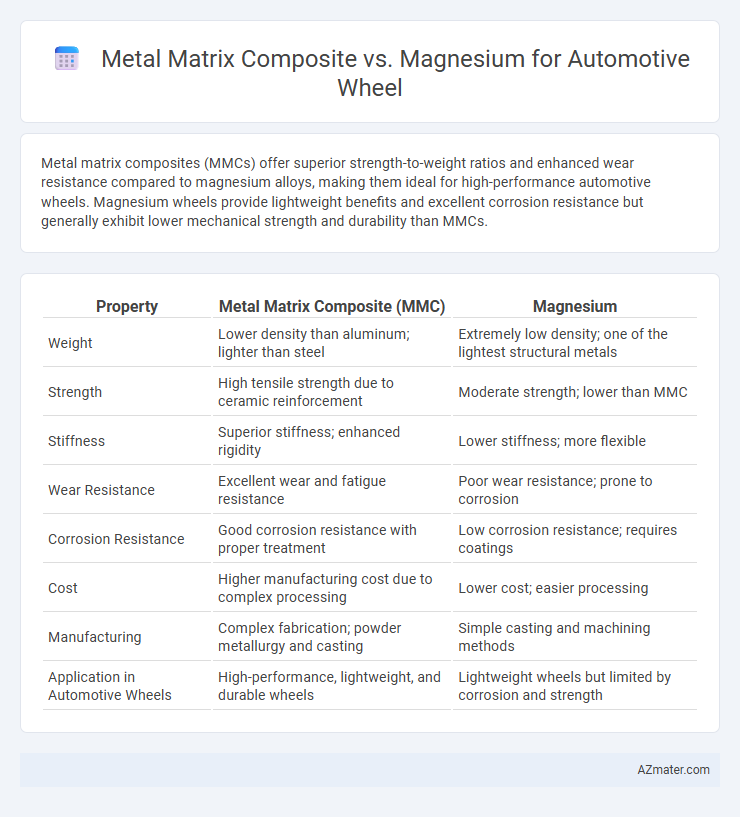Metal matrix composites (MMCs) offer superior strength-to-weight ratios and enhanced wear resistance compared to magnesium alloys, making them ideal for high-performance automotive wheels. Magnesium wheels provide lightweight benefits and excellent corrosion resistance but generally exhibit lower mechanical strength and durability than MMCs.
Table of Comparison
| Property | Metal Matrix Composite (MMC) | Magnesium |
|---|---|---|
| Weight | Lower density than aluminum; lighter than steel | Extremely low density; one of the lightest structural metals |
| Strength | High tensile strength due to ceramic reinforcement | Moderate strength; lower than MMC |
| Stiffness | Superior stiffness; enhanced rigidity | Lower stiffness; more flexible |
| Wear Resistance | Excellent wear and fatigue resistance | Poor wear resistance; prone to corrosion |
| Corrosion Resistance | Good corrosion resistance with proper treatment | Low corrosion resistance; requires coatings |
| Cost | Higher manufacturing cost due to complex processing | Lower cost; easier processing |
| Manufacturing | Complex fabrication; powder metallurgy and casting | Simple casting and machining methods |
| Application in Automotive Wheels | High-performance, lightweight, and durable wheels | Lightweight wheels but limited by corrosion and strength |
Introduction to Automotive Wheel Materials
Metal matrix composites (MMCs) offer superior strength-to-weight ratios and enhanced wear resistance compared to conventional magnesium alloys commonly used in automotive wheels. Magnesium provides lightweight properties essential for improving fuel efficiency, but MMCs incorporate ceramic reinforcements such as silicon carbide to achieve higher stiffness and thermal stability. Advanced MMCs enable automotive wheels to deliver improved performance, durability, and reduced weight, addressing the demands of modern vehicles for enhanced handling and energy efficiency.
Overview of Metal Matrix Composites (MMCs)
Metal Matrix Composites (MMCs) for automotive wheels offer superior specific strength and stiffness compared to magnesium alloys, enhancing performance and fuel efficiency. MMCs integrate ceramic reinforcements such as silicon carbide or alumina within a metal matrix, improving wear resistance and thermal stability under demanding driving conditions. This combination results in lightweight, durable wheels with improved impact resistance and reduced deformation, making MMCs a cutting-edge material choice over traditional magnesium options.
Magnesium Alloys in Automotive Wheels
Magnesium alloys used in automotive wheels offer superior lightweight properties compared to traditional metal matrix composites, enhancing fuel efficiency and vehicle performance. These alloys provide excellent strength-to-weight ratios and improved corrosion resistance, crucial for durable, high-performance wheels. Innovations in magnesium alloy composition and processing techniques continue to advance automotive wheel design, optimizing safety and weight reduction.
Mechanical Properties: MMCs vs Magnesium
Metal matrix composites (MMCs) exhibit superior mechanical properties compared to magnesium alloys for automotive wheels, offering higher tensile strength, enhanced wear resistance, and improved fatigue life. MMCs typically combine lightweight metal matrices with reinforcing particles or fibers, resulting in enhanced stiffness and impact resistance while maintaining lower density. Magnesium alloys, while lightweight and corrosion-resistant, generally provide lower mechanical strength and reduced durability under high stress conditions compared to MMC counterparts.
Weight Reduction and Fuel Efficiency
Metal matrix composites (MMCs) for automotive wheels offer significant weight reduction compared to magnesium alloys, enhancing fuel efficiency by lowering rotational mass and improving acceleration. MMCs exhibit superior strength-to-weight ratios and wear resistance, enabling thinner wheel designs without compromising durability. This combination directly reduces overall vehicle weight, leading to measurable improvements in fuel economy and reduced CO2 emissions.
Corrosion Resistance and Durability
Metal matrix composites (MMCs) exhibit superior corrosion resistance compared to traditional magnesium alloys, significantly reducing oxidation and surface degradation in automotive wheels. Enhanced durability of MMCs results from their reinforced microstructure, which resists wear, fatigue, and mechanical stress more effectively than magnesium. Consequently, MMC automotive wheels offer extended service life and improved performance in harsh environmental conditions.
Manufacturing Processes and Cost Factors
Metal matrix composites (MMCs) for automotive wheels offer superior strength-to-weight ratios compared to traditional magnesium alloys, enhancing performance but involving complex manufacturing processes like powder metallurgy and stir casting that increase production costs. Magnesium wheels benefit from well-established casting techniques such as high-pressure die casting, resulting in lower manufacturing expenses but reduced mechanical properties and durability. Cost factors favor magnesium due to lower raw material and processing costs, while MMCs demand higher investment in material synthesis and precision machining, impacting overall pricing and application feasibility.
Performance in Real-World Driving Conditions
Metal matrix composites (MMCs) offer superior strength-to-weight ratios and enhanced wear resistance compared to magnesium, significantly improving durability and handling in real-world driving conditions. Magnesium wheels provide excellent lightweight properties, reducing unsprung mass and enhancing fuel efficiency, but their lower stiffness can compromise performance under high stress. MMCs maintain structural integrity under thermal and mechanical loads encountered during aggressive driving, delivering better long-term reliability and safety for automotive wheels.
Environmental Impact and Sustainability
Metal matrix composites (MMCs) for automotive wheels offer superior strength-to-weight ratio and corrosion resistance compared to traditional magnesium alloys, resulting in longer wheel lifespan and reduced material waste. MMCs typically involve energy-intensive manufacturing processes but enable significant fuel efficiency gains by lowering unsprung mass, contributing to overall vehicle emission reductions. Magnesium wheels provide recyclability benefits due to magnesium's abundance and lower production energy compared to MMCs, but their shorter durability can lead to higher replacement rates, impacting sustainability negatively.
Future Trends and Innovations in Wheel Materials
Metal matrix composites (MMCs) offer superior strength-to-weight ratios and enhanced wear resistance compared to traditional magnesium alloys, positioning them as a key innovation in automotive wheel materials. Emerging trends include the integration of nano-reinforcements and advanced fabrication techniques like additive manufacturing to improve MMC performance and reduce costs. Future developments focus on optimizing MMC blends for corrosion resistance and recyclability, driving sustainable lightweight wheel solutions in the automotive industry.

Infographic: Metal matrix composite vs Magnesium for Automotive wheel
 azmater.com
azmater.com